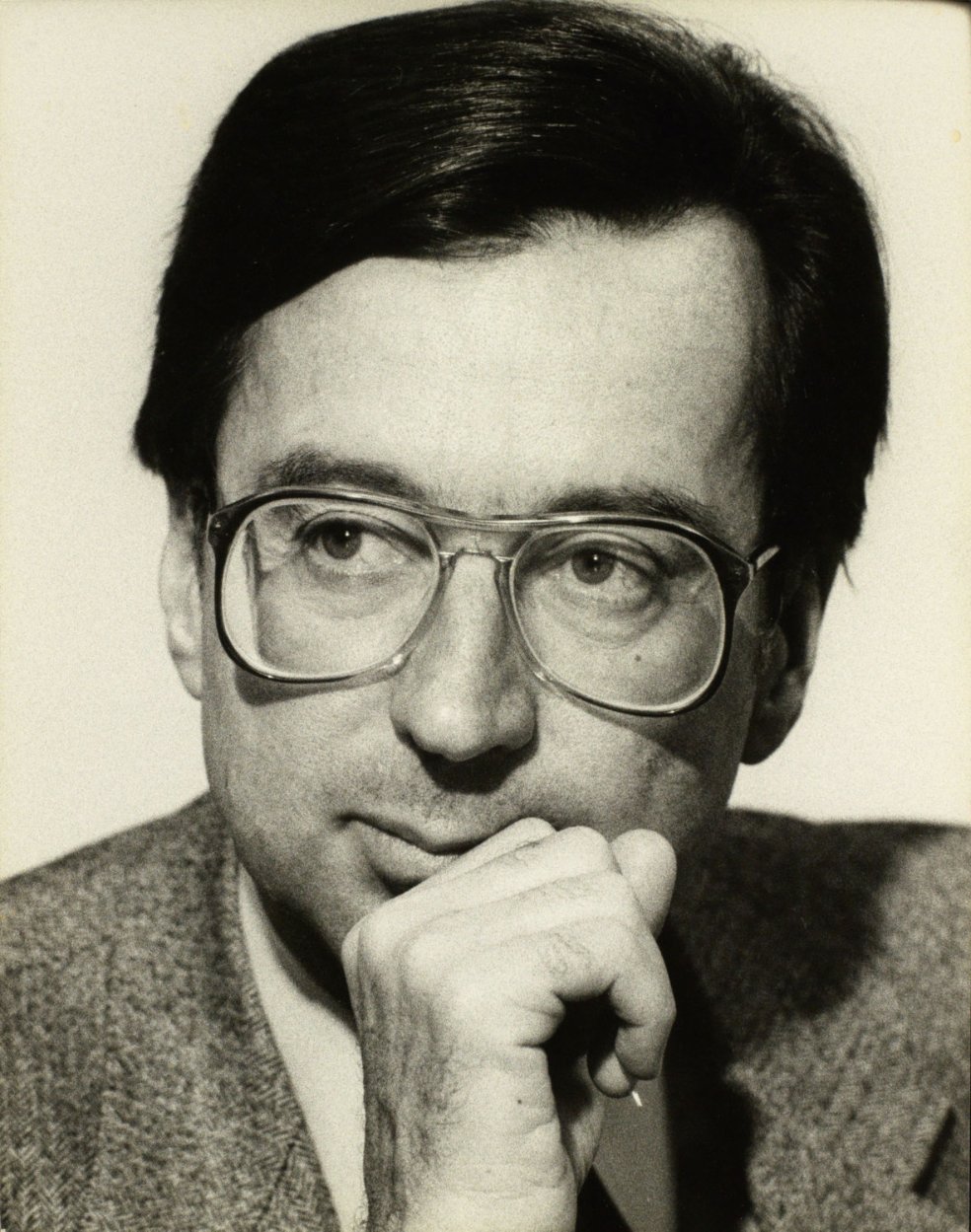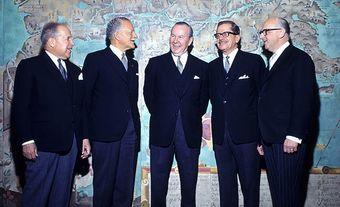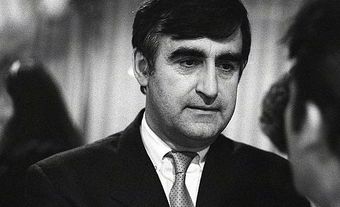
Education and Early Career
Johnson was the youngest son of Québec premier Daniel Johnson, Sr., and Reine Gagné. He studied at the Collège Jean-de-Brébeuf at Université de Montréal and at Université de Sherbrooke. He was called to the Québec Bar in 1971, and received a degree from the Faculty of Medicine at Université de Sherbrooke in July 1975. He was an active member of various student associations (from 1966 to 1973), taught at the Cégep de Sherbrooke (1972 and 1973) and practised medicine in Montréal before becoming a candidate for the Parti Québécois (PQ) in November 1976.
Member of the National Assembly, Minister and Premier
During his first two terms with the PQ, Johnson held various positions within René Lévesque’s Cabinet: Member of the National Assembly for Anjou in 1976 (with re-election in 1981 and 1985); Minister of Labour from 1977 to 1980; Minister of Consumers, Co-operatives and Financial Institutions from 1980 to 1981; Minister of Social Affairs from 1981 to 1984; Minister Responsible for Canadian Intergovernmental Affairs from 1984 to 1985; and Minister of Justice and Attorney General from 1984 to 1985. He was behind Bill 45 (see Labour Relations), which modified Québec’s Labour Code, commonly known as the “Anti-Scabs Act” (see Strikes and Lockouts).

In May 1985, as Minister Responsible for Canadian Intergovernmental Affairs, Johnson announced the conditions that would be required for the Québec government to give its support to the constitutional agreement, including recognition of Québec’s distinct status, its veto and provisions regarding its ability to withdraw with financial compensation in the event that federal-provincial agreements were made without Québec’s consent (see Federal-Provincial Relations). However, this “beau risque” strategy led to a crisis within the PQ, causing a group of ministers to resign.
On 20 June 1985, René Lévesque announced that he was stepping down as leader of the PQ. Johnson succeeded him in September 1985, after winning the leadership race in a vote open to all party members — the first leadership convention of its kind in Canada. He was sworn in on 3 October 1985, becoming the 24th Premier of Québec. However, he held the position for only three months before losing the general election that he had called about 20 days after being sworn in. Nevertheless, during his brief mandate he succeeded in negotiating an agreement with the Government of Canada to determine Québec’s conditions for participation in deliberations for future Summits of La Francophonie.
Leader of the Opposition
Although the PQ lost to Robert Bourassa’s Liberals on 2 December 1985, Johnson was re-elected for his third term in the riding of Anjou. In June 1987, he strengthened his position as leader at the party’s convention with his plan to defer Québec independence, while working toward “national affirmation” (see Sovereignty-Association). However, on 10 November 1987, Johnson announced he was stepping down as party leader. Jacques Parizeau succeeded him as leader of the PQ and of the official Opposition.
Life after Politics
From 1988 to 1998, Johnson was a professor at the Faculty of Law at McGill University and was named Director of Research at the Centre for Medicine, Ethics and Law. In 1999, he was a mediator and expert for the United Nations, the World Bank and the North American Commission for Environmental Cooperation. In 2001, he became co-president of the International Symposium on Business and Sustainable Development at the Summit of the Americas in Québec. His expertise in commercial law and international relations led him to write several essays and articles about participation of civil society and the environment in the context of globalization, as well as a work entitled The Environment and NAFTA: Understanding and Implementing the New Continental Law, which he published with André Beaulieu in 1996.
Johnson also sat on the board of directors of various corporations, including UniMédia (from 1990 to 1998); SNC, later renamed SNC Lavalin (from 1990 to 1998); Air Canada (from 2000 to 2003); Ace Aviation Holdings (since 2003) and its affiliates Aeroplan (since 2004) and Jazz (since 2005). He also holds positions within organizations and institutions involved in sustainable development. He was a founding member, vice-president of the board of directors and president of the committee on foreign affairs for the National Round Table on the Environment and the Economy in Ottawa (from 1989 to 1997), a member of the International Institute for Sustainable Development in Winnipeg (from 1990 to 1996), the Environmental Training Institute of North America in Mexico City (from 1994 to 1999), the International Union for Conservation of Nature in Geneva (1997 and 2000) and the Veolia Institute in Paris (2000).
In 2001, he became the Québec government’s adviser and chief negotiator in the Canada-U.S. softwood lumber dispute. He was appointed president of the Commission of Inquiry into the Collapse of a Portion of the De la Concorde Overpass in 2006, as well as the Québec government’s chief negotiator for the free trade initiative between Canada and the European Union in 2009.
Johnson worked as legal counsel at Guy & Gilbert from 1988 to 1996, and later at Heenan Blaikie. Since February 2014, he has worked at Lavery. He is known as one of the best international arbitrators in Canada since 2012. He is the brother of Daniel Johnson, Jr., the 25th Premier of Québec.
Awards and Distinctions
Member of the Royal Society of Canada (1993)
Honorary Doctorate from Université Claude-Bernard de Lyon (1997)
Grand Officer of the Ordre de la Pléiade, Assemblée parlementaire de la Francophonie (2000)
Grand Ambassadeur du Réseau des diplômés at Université de Sherbrooke (2005)
Grand Officer of the National Order of Québec (2008)
Honorary Doctorate from Université de Montréal (2014)

 Share on Facebook
Share on Facebook Share on X
Share on X Share by Email
Share by Email Share on Google Classroom
Share on Google Classroom



